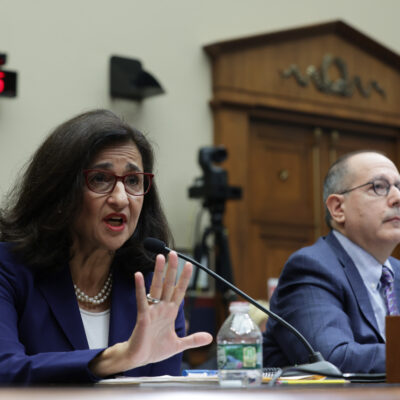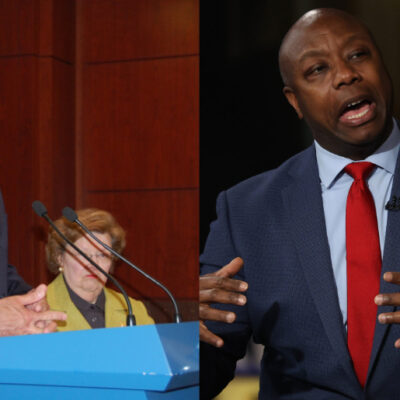Murphy urges U.S. to deprioritize Iran, says Saudis should to ‘come to terms’ with Hezbollah influence
The senator said the U.S. should deprioritize Iran deterrence and urge Saudi Arabia to ‘come to terms’ with Hezbollah in Lebanon

Greg Nash/POOL/AFP
Sen. Chris Murphy (D-CT) speaks during the Senate Foreign Relations Committee hearing on the nomination of Linda Thomas-Greenfield to be the United States Ambassador to the United Nations, on Capitol Hill in Washington, DC, on January 27, 2021.
Sen. Chris Murphy (D-CT), the chair of the Senate Foreign Relations subcommittee focusing on Middle East issues, believes the U.S. should deprioritize Iran deterrence and urge Saudi Arabia to “come to terms” with Hezbollah’s influence in Lebanon, he said in Tuesday podcast interview with the Center for Strategic and International Studies.
Murphy argued that the U.S. should be decreasing its overall “militaristic footprint” in the region — including its security aid to Saudi Arabia and the United Arab Emirates.
“How much does it matter to the United States what share of power Iran and Saudi Arabia have in the region 10 or 20 years from now? We act as if that question is existential to the United States. I’m not sure that it is,” Murphy said, adding that he is skeptical whether “providing security guarantees big enough to provide deterrence against the Iranians — for instance, creating red lines about what they can and cannot do in a place like Lebanon… is commensurate with our interest in the region.”
“We have an interest in keeping the Iranians at bay,” he continued. “We have an interest in continuing to work with our partners, but I don’t know that it is such a significant interest that we should be dramatically increasing the security presence of the United States in the region.”
Murphy recounted that Iranian Foreign Minister Mohammad Javad Zarif “always reminds” him that Iranian missiles are pointed at Saudi Arabia, not Israel. He acknowledged, however, that he takes “everying [Zarif] says with a large shaker of salt.”
Rather than increasing security aid to Gulf allies, which Iran finds “provocative,” Murphy said the U.S.’s priority should be reentering the Joint Comprehensive Plan of Action and reaching other long-term diplomatic agreements with Iran.
“I think that having some successful long-term diplomatic agreements between the United States and the Iranians will help build confidence for other diplomatic arrangements — either formal or informal — to be entered into that perhaps lower the temperature in the region,” Murphy said. He added that scaling back the U.S.’s military presence and aid would “create the space for there to be conversations between the Iranians and the Saudis.”
Murphy previously told Jewish Insider that he believes a nuclear deal is the only way for the U.S. to deal with Iran’s nuclear program and will have to make “hard choices” to achieve that end.
Murphy warned that Lebanon, which has been besieged by a series of crises, is on the brink of becoming a failed state and a source of instability and terrorism that could last decades. He blamed the deteriorating situation in part on a lack of Saudi engagement due to Hezbollah’s influence inside Lebanon.
“[The Saudis] are deeply uncomfortable with the role that Hezbollah plays. The Saudis should come to terms with the fact that — at least in the short term — Hezbollah is going to be part of the political infrastructure there,” he said. “It would be much better for the Saudis to be a partner with the United States, with the French and other countries to try to offer the kind of economic support that might provoke political reform that would eventually allow for technocrats and non-sectarian actors to have greater influence in the government. That would lessen the influence of Hezbollah.”
Murphy’s proposals on Iran and Lebanon reflect his broader view of U.S. Middle East policy as severely out of date.
“What we want is to try to midwife a conversation about a regional security architecture, in which the Iranians and the Saudis and the Emiratis aren’t constantly battling with each other through proxy fights,” he said. “I don’t think that our current position in the region — whereby we are essentially giving the Saudi side whatever they need — is actually leading to that détente or to that conversation happening.”
A key part of an altered U.S. strategy must include “play[ing] hardball” with the Saudis,” Murphy continued, dismissing concerns that decreased U.S. influence could create openings for its geopolitical rivals.
“I don’t believe this argument that the Saudis are going to walk away from a security alliance with the United States,” he explained. “They will never get from the Chinese nor the Russians what they get from the United States today… They want us to be tougher on Iran, but they don’t have another potential partner like the United States.”
Murphy indicated he has concerns that China is outpacing the U.S. by providing significant development aid, rather than security aid, in the Middle East, requiring a “radical reform of our foreign policy toolkit.” He pointed to Egypt relations as an example of the failures of U.S. aid policy. China has been ramping up its investments in Egypt as part of its Belt and Road Initiative.
“All we have available to us right now in Egypt is public shaming and the withdrawal of military aid, whereas the Chinese will come in with much more significant economic promise than the United States can today,” Murphy said. “We should learn from the success the Chinese have had, and we should empower agencies — whether it be [the United States Agency for International Development] or the Development Finance Corporation — with the kind of economic assets that can be comparable to the Chinese.”








